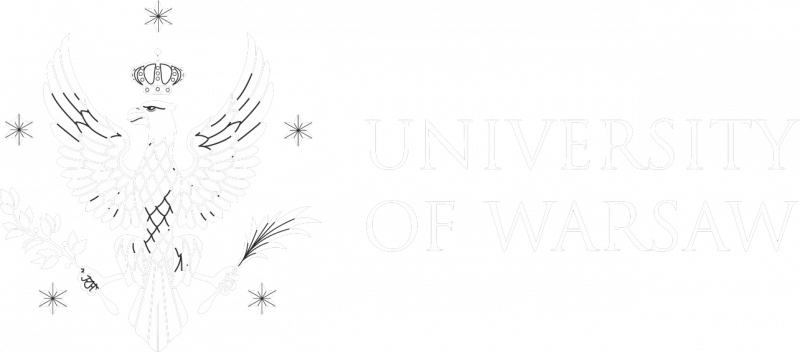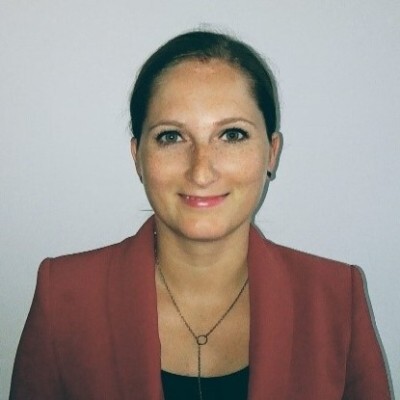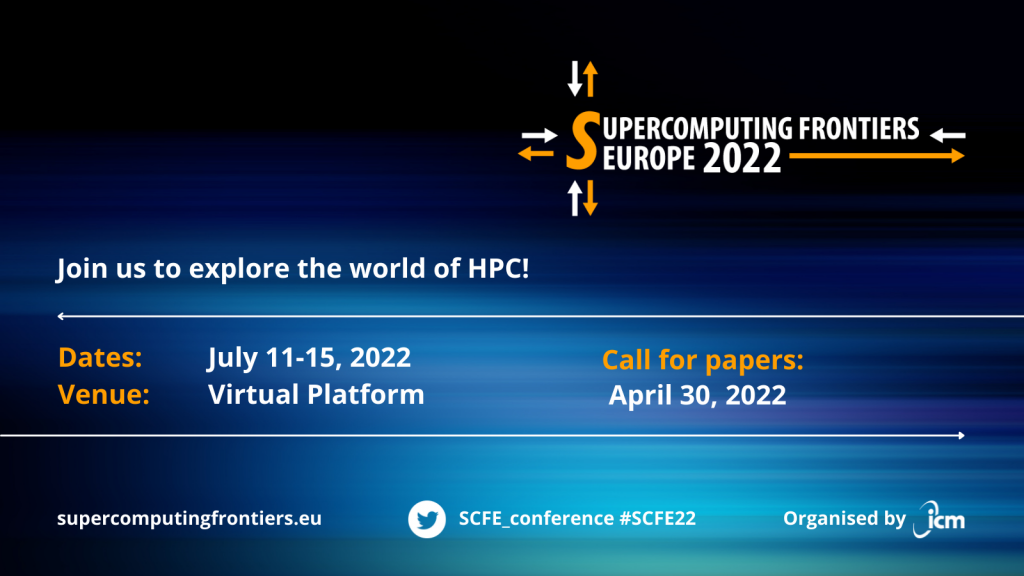SUPERCOMPUTING FRONTIERS EUROPE
...will explore visionary trends and innovations in HPC and computational science
Call for papers
- Hybrid quantum computing and HPC
- Hybrid cloud/HPC
- Convergence of HPC, AI and Big Data
- Omics and Systems Biology
- Storage class memory
- Special architectures
- Deep learning computing – TPU, GPU and beyond
- Problem Solving Environments
- …and more.
Don’t wait any longer and submit your paper to Easy Chair.
From Singapore to Warsaw – the history of supercomputing frontiers
- Roberto Car (Princeton University) | 2021
- Irene Qualters (US Department of Energy) | 2021
- Hiroaki Kinatno (the Systems Biology Institute) | 2021
- Anders Dam Jensen (EuroHPC JU) | 2021
- James K. Gimzewski (University of California) | 2020
- Rob Knight (University of California) | 2020
- Ziogas Aleksandros Nikolaos (ETH Zurich) |2020
- Rupak Biswas (NASA Ames Research Centre) | 2019
- Leon Chua (University of California Berkeley)| 2019
- Paul Mesina (Argonne National Laboratory) | 2019
- Whitfield Diffie | 2018
- Thomas Sterling (Indiana University) | 2018
- Karlheinz Meier (Heidelberg University) | 2018
- Dimitr Kusnezov (Department of Energy) | 2018
From Singapore to Warsaw – the history of supercomputing frontiers
- Roberto Car (Princeton University) | 2021
- Irene Qualters (US Department of Energy) | 2021
- Hiroaki Kinatno (the Systems Biology Institute) | 2021
- Anders Dam Jensen (EuroHPC JU) | 2021
- James K. Gimzewski (University of California) | 2020
- Rob Knight (University of California) | 2020
- Ziogas Aleksandros Nikolaos (ETH Zurich) |2020
- Rupak Biswas (NASA Ames Research Centre) | 2019
- Leon Chua (University of California Berkeley)| 2019
- Paul Mesina (Argonne National Laboratory) | 2019
- Whitfield Diffie | 2018
- Thomas Sterling (Indiana University) | 2018
- Karlheinz Meier (Heidelberg University) | 2018
- Dimitr Kusnezov (Department of Energy) | 2018
Papers
Supercomputing Frontiers and Innovations Vol 2, No 3 was a special issue dedicated to the International Conference “Supercomputing Frontiers 2015”. Invited editors were Marek Michalewicz and Yuefan Deng.
Foreword to the Special Issue
Marek Michalewicz, Yuefan Deng
Data Exploration at the Exascale
Hank Childs
InfiniCloud: Leveraging the Global InfiniCortex Fabric and OpenStack Cloud for Borderless High Performance Computing of Genomic Data
Kenneth Hon Kim Ban, Jakub Chrzeszczyk, Andrew Howard, Dongyang Li, Tin Wee Tan
Performance Assessment of InfiniBand HPC Cloud Instances on Intel Haswell and Intel Sandy Bridge Architectures
Jonathan Low, Jakub Chrzeszczyk, Andrew Howard, Andrzej Chrzeszczyk
The L-CSC cluster: Optimizing power efficiency to become the greenest supercomputer in the world in the Green500 list of November 2014
David Rohr, Gvozden Neskovic, Volker Lindenstruth
An Autonomic Performance Environment for Exascale
Kevin A. Huck, Allan Porterfield, Nick Chaimov, Hartmut Kaiser, Allen D. Malony, Thomas Sterling, Rob Fowler
Visualization for Exascale: Portable Performance is Critical
Kenneth Moreland, Matthew Larsen, Hank Childs
A Case for Embedded FPGA-based SoCs in Energy-Efficient Acceleration of Graph Problems
Nachiket Kapre, Pradeep Moorthy
Live Programming in Scientific Simulation
Ben Swift, Andrew Sorensen, Henry Gardner, Peter Davis, Viktor K. Decyk
Creating interconnect topologies by algorithmic edge removal: MOD and SMOD graphs
Marek T. Michalewicz, Łukasz P. Orłowski, Yuefan Deng
A Dynamic Congestion Management System for InfiniBand Networks
Fabrice Mizero, Malathi Veeraraghavan, Qian Liu, Robert D. Russell, John M. Dennis
Many-Core Approaches to Combinatorial Problems: case of the Langford Problem
Michaël Krajecki, Julien Loiseau, François Alin, Christophe Jaillet
A Radical Approach to Computation with Real Numbers
John L. Gustafson
InfiniCloud 2.0: distributing High Performance Computing across continents.
Jakub Chrzeszczyk, Andrew Howard, Andrzej Chrzeszczyk, Ben Swift, Peter Davis, Jonathan Low, Tin Wee Tan, Kenneth Ban
Making Large-Scale Systems Observable – Another Inescapable Step Towards Exascale
Dmitry A. Nikitenko, Sergey A. Zhumatiy, Pavel A. Shvets
Using High Performance Computing to Create and Freely Distribute the South Asian Genomic Database, Necessary for Precision Medicine in this Population
Asmi H. Shah, Jonathan D. Picker, Saumya S. Jamuar
An Application of GPU Acceleration in CFD Simulation for Insect Flight
Yang Yao, Khoon-Seng Yeo
Simultac Fonton: A Fine-Grain Architecture for Extreme Performance beyond Moore’s Law
Maciej Brodowicz, Thomas Sterling
The Simultaneous Transmit And Receive (STAR) Message Protocol
Earle Jennings
Core Module Optimizing PDE Sparse Matrix Models With HPCG Example
Earle Jennings
Beating Floating Point at its Own Game: Posit Arithmetic
John L. Gustafson, Isaac T. Yonemoto
InfiniCortex – From Proof-of-concept to Production
Gabriel Noaje, Alan Davis, Jonathan Low, Seng Lim, Geok Lian Tan, Łukasz Orłowski, Dominic Chien, Sing-Wu Liou, Tin Wee Tan, Yves Poppe, Kenneth Ban Hon Kim, Andrew Howard, David Southwell, Jason Gunthorpe, Marek Michalewicz
High Performance Computing with Coarse Grained Model of Biological Macromolecules
Emilia Agnieszka Lubecka, Adam Kazimierz Sieradzan, Cezary Czaplewski, Paweł Krupa, Adam Liwo
Numerical Simulations of Black Hole Accretion Flows
Agnieszka Janiuk, Konstantinos Sapountzis, Jeremy Mortier, Ireneusz Janiuk
Continuum Computing – on a New Performance Trajectory beyond Exascale
Maciej Brodowicz, Thomas Sterling, Matthew Anderson
Investigating the Dirac Operator Evaluation with FPGAs
Grzegorz Korcyl, Piotr Korcyl
Development of a RISC-V-Conform Fused Multiply-Add Floating-Point Unit
Felix Kaiser, Stefan Kosnac, Ulrich Brüning
Fully Implicit Time Stepping Can Be Efficient on Parallel Computers
Brandon Cloutier, Benson K. Muite, Matteo Parsani
Performance Limits Study of Stencil Codes on Modern GPGPUs
Ilya S. Pershin, Vadim D. Levchenko, Anastasia Y. Perepelkina
Long Distance Geographically Distributed InfiniBand Based Computing
Karol Niedzielewski, Marcin Semeniuk, Jarosław Skomiał, Jerzy Proficz, Piotr Sumioka, Bartosz Pliszka, Marek Michalewicz
Potential of I/O Aware Workflows in Climate and Weather
Julian M. Kunkel, Luciana R. Pedro
Supercomputing Frontiers and Innovations Vol 2, No 3 was a special issue dedicated to the International Conference “Supercomputing Frontiers 2015”. Invited editors were Marek Michalewicz and Yuefan Deng.
Foreword to the Special Issue
Marek Michalewicz, Yuefan Deng
Data Exploration at the Exascale
Hank Childs
InfiniCloud: Leveraging the Global InfiniCortex Fabric and OpenStack Cloud for Borderless High Performance Computing of Genomic Data
Kenneth Hon Kim Ban, Jakub Chrzeszczyk, Andrew Howard, Dongyang Li, Tin Wee Tan
Performance Assessment of InfiniBand HPC Cloud Instances on Intel Haswell and Intel Sandy Bridge Architectures
Jonathan Low, Jakub Chrzeszczyk, Andrew Howard, Andrzej Chrzeszczyk
The L-CSC cluster: Optimizing power efficiency to become the greenest supercomputer in the world in the Green500 list of November 2014
David Rohr, Gvozden Neskovic, Volker Lindenstruth
An Autonomic Performance Environment for Exascale
Kevin A. Huck, Allan Porterfield, Nick Chaimov, Hartmut Kaiser, Allen D. Malony, Thomas Sterling, Rob Fowler
Visualization for Exascale: Portable Performance is Critical
Kenneth Moreland, Matthew Larsen, Hank Childs
A Case for Embedded FPGA-based SoCs in Energy-Efficient Acceleration of Graph Problems
Nachiket Kapre, Pradeep Moorthy
Live Programming in Scientific Simulation
Ben Swift, Andrew Sorensen, Henry Gardner, Peter Davis, Viktor K. Decyk
Creating interconnect topologies by algorithmic edge removal: MOD and SMOD graphs
Marek T. Michalewicz, Łukasz P. Orłowski, Yuefan Deng
A Dynamic Congestion Management System for InfiniBand Networks
Fabrice Mizero, Malathi Veeraraghavan, Qian Liu, Robert D. Russell, John M. Dennis
Many-Core Approaches to Combinatorial Problems: case of the Langford Problem
Michaël Krajecki, Julien Loiseau, François Alin, Christophe Jaillet
A Radical Approach to Computation with Real Numbers
John L. Gustafson
InfiniCloud 2.0: distributing High Performance Computing across continents.
Jakub Chrzeszczyk, Andrew Howard, Andrzej Chrzeszczyk, Ben Swift, Peter Davis, Jonathan Low, Tin Wee Tan, Kenneth Ban
Making Large-Scale Systems Observable – Another Inescapable Step Towards Exascale
Dmitry A. Nikitenko, Sergey A. Zhumatiy, Pavel A. Shvets
Using High Performance Computing to Create and Freely Distribute the South Asian Genomic Database, Necessary for Precision Medicine in this Population
Asmi H. Shah, Jonathan D. Picker, Saumya S. Jamuar
An Application of GPU Acceleration in CFD Simulation for Insect Flight
Yang Yao, Khoon-Seng Yeo
Simultac Fonton: A Fine-Grain Architecture for Extreme Performance beyond Moore’s Law
Maciej Brodowicz, Thomas Sterling
The Simultaneous Transmit And Receive (STAR) Message Protocol
Earle Jennings
Core Module Optimizing PDE Sparse Matrix Models With HPCG Example
Earle Jennings
Beating Floating Point at its Own Game: Posit Arithmetic
John L. Gustafson, Isaac T. Yonemoto
InfiniCortex – From Proof-of-concept to Production
Gabriel Noaje, Alan Davis, Jonathan Low, Seng Lim, Geok Lian Tan, Łukasz Orłowski, Dominic Chien, Sing-Wu Liou, Tin Wee Tan, Yves Poppe, Kenneth Ban Hon Kim, Andrew Howard, David Southwell, Jason Gunthorpe, Marek Michalewicz
High Performance Computing with Coarse Grained Model of Biological Macromolecules
Emilia Agnieszka Lubecka, Adam Kazimierz Sieradzan, Cezary Czaplewski, Paweł Krupa, Adam Liwo
Numerical Simulations of Black Hole Accretion Flows
Agnieszka Janiuk, Konstantinos Sapountzis, Jeremy Mortier, Ireneusz Janiuk
Continuum Computing – on a New Performance Trajectory beyond Exascale
Maciej Brodowicz, Thomas Sterling, Matthew Anderson
Investigating the Dirac Operator Evaluation with FPGAs
Grzegorz Korcyl, Piotr Korcyl
Development of a RISC-V-Conform Fused Multiply-Add Floating-Point Unit
Felix Kaiser, Stefan Kosnac, Ulrich Brüning
Fully Implicit Time Stepping Can Be Efficient on Parallel Computers
Brandon Cloutier, Benson K. Muite, Matteo Parsani
Performance Limits Study of Stencil Codes on Modern GPGPUs
Ilya S. Pershin, Vadim D. Levchenko, Anastasia Y. Perepelkina
Long Distance Geographically Distributed InfiniBand Based Computing
Karol Niedzielewski, Marcin Semeniuk, Jarosław Skomiał, Jerzy Proficz, Piotr Sumioka, Bartosz Pliszka, Marek Michalewicz
Potential of I/O Aware Workflows in Climate and Weather
Julian M. Kunkel, Luciana R. Pedro
Papers
Supercomputing Frontiers and Innovations Vol 2, No 3 was a special issue dedicated to the International Conference “Supercomputing Frontiers 2015”. Invited editors were Marek Michalewicz and Yuefan Deng.
Foreword to the Special Issue
Marek Michalewicz, Yuefan Deng
Data Exploration at the Exascale
Hank Childs
InfiniCloud: Leveraging the Global InfiniCortex Fabric and OpenStack Cloud for Borderless High Performance Computing of Genomic Data
Kenneth Hon Kim Ban, Jakub Chrzeszczyk, Andrew Howard, Dongyang Li, Tin Wee Tan
Performance Assessment of InfiniBand HPC Cloud Instances on Intel Haswell and Intel Sandy Bridge Architectures
Jonathan Low, Jakub Chrzeszczyk, Andrew Howard, Andrzej Chrzeszczyk
The L-CSC cluster: Optimizing power efficiency to become the greenest supercomputer in the world in the Green500 list of November 2014
David Rohr, Gvozden Neskovic, Volker Lindenstruth
An Autonomic Performance Environment for Exascale
Kevin A. Huck, Allan Porterfield, Nick Chaimov, Hartmut Kaiser, Allen D. Malony, Thomas Sterling, Rob Fowler
Visualization for Exascale: Portable Performance is Critical
Kenneth Moreland, Matthew Larsen, Hank Childs
A Case for Embedded FPGA-based SoCs in Energy-Efficient Acceleration of Graph Problems
Nachiket Kapre, Pradeep Moorthy
Live Programming in Scientific Simulation
Ben Swift, Andrew Sorensen, Henry Gardner, Peter Davis, Viktor K. Decyk
Creating interconnect topologies by algorithmic edge removal: MOD and SMOD graphs
Marek T. Michalewicz, Łukasz P. Orłowski, Yuefan Deng
A Dynamic Congestion Management System for InfiniBand Networks
Fabrice Mizero, Malathi Veeraraghavan, Qian Liu, Robert D. Russell, John M. Dennis
Many-Core Approaches to Combinatorial Problems: case of the Langford Problem
Michaël Krajecki, Julien Loiseau, François Alin, Christophe Jaillet
A Radical Approach to Computation with Real Numbers
John L. Gustafson
InfiniCloud 2.0: distributing High Performance Computing across continents.
Jakub Chrzeszczyk, Andrew Howard, Andrzej Chrzeszczyk, Ben Swift, Peter Davis, Jonathan Low, Tin Wee Tan, Kenneth Ban
Making Large-Scale Systems Observable – Another Inescapable Step Towards Exascale
Dmitry A. Nikitenko, Sergey A. Zhumatiy, Pavel A. Shvets
Using High Performance Computing to Create and Freely Distribute the South Asian Genomic Database, Necessary for Precision Medicine in this Population
Asmi H. Shah, Jonathan D. Picker, Saumya S. Jamuar
An Application of GPU Acceleration in CFD Simulation for Insect Flight
Yang Yao, Khoon-Seng Yeo
Simultac Fonton: A Fine-Grain Architecture for Extreme Performance beyond Moore’s Law
Maciej Brodowicz, Thomas Sterling
The Simultaneous Transmit And Receive (STAR) Message Protocol
Earle Jennings
Core Module Optimizing PDE Sparse Matrix Models With HPCG Example
Earle Jennings
Beating Floating Point at its Own Game: Posit Arithmetic
John L. Gustafson, Isaac T. Yonemoto
InfiniCortex – From Proof-of-concept to Production
Gabriel Noaje, Alan Davis, Jonathan Low, Seng Lim, Geok Lian Tan, Łukasz Orłowski, Dominic Chien, Sing-Wu Liou, Tin Wee Tan, Yves Poppe, Kenneth Ban Hon Kim, Andrew Howard, David Southwell, Jason Gunthorpe, Marek Michalewicz
High Performance Computing with Coarse Grained Model of Biological Macromolecules
Emilia Agnieszka Lubecka, Adam Kazimierz Sieradzan, Cezary Czaplewski, Paweł Krupa, Adam Liwo
Numerical Simulations of Black Hole Accretion Flows
Agnieszka Janiuk, Konstantinos Sapountzis, Jeremy Mortier, Ireneusz Janiuk
Continuum Computing – on a New Performance Trajectory beyond Exascale
Maciej Brodowicz, Thomas Sterling, Matthew Anderson
Investigating the Dirac Operator Evaluation with FPGAs
Grzegorz Korcyl, Piotr Korcyl
Development of a RISC-V-Conform Fused Multiply-Add Floating-Point Unit
Felix Kaiser, Stefan Kosnac, Ulrich Brüning
Fully Implicit Time Stepping Can Be Efficient on Parallel Computers
Brandon Cloutier, Benson K. Muite, Matteo Parsani
Performance Limits Study of Stencil Codes on Modern GPGPUs
Ilya S. Pershin, Vadim D. Levchenko, Anastasia Y. Perepelkina
Long Distance Geographically Distributed InfiniBand Based Computing
Karol Niedzielewski, Marcin Semeniuk, Jarosław Skomiał, Jerzy Proficz, Piotr Sumioka, Bartosz Pliszka, Marek Michalewicz
Potential of I/O Aware Workflows in Climate and Weather
Julian M. Kunkel, Luciana R. Pedro
Virtual ICM Seminars
With the reception of the virtual SCFE 2020 event exceeding our expectations, we have decided to maintain momentum and to provide a monthly platform for HPC and computing science community through the Virtual ICM Seminars in Computer and Computational Science – the series, which have already attracted 1330 viewers.
Next Virtual ICM Seminar will be held on December 16th and will host prof. Wiesław Nowiński who is the creator of the „world’s most gorgeous” human brain atlases.
Virtual ICM Seminars
With the reception of the virtual SCFE 2020 event exceeding our expectations, we have decided to maintain momentum and to provide a monthly platform for HPC and computing science community through the Virtual ICM Seminars in Computer and Computational Science – the series, which have already attracted 1330 viewers.
Next Virtual ICM Seminar will be held on December 16th and will host prof. Wiesław Nowiński who is the creator of the „world’s most gorgeous” human brain atlases.




